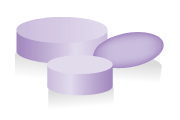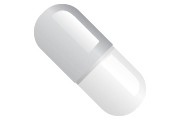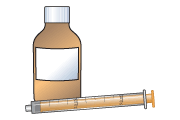Loperamide for diarrhoea
This leaflet is for parents and carers about how to use this medicine in children. Our information may differ from that provided by the manufacturers, because their information usually relates to adults. Read this leaflet carefully. Keep it somewhere safe so that you can read it again.
You should only give your child Loperamide if your doctor has prescribed it. If your child has diarrhoea, do not buy Loperamide from the pharmacist to give to them. You must take them to see your doctor first.
Name of medicine
Loperamide
Brand names: Imodium, Norimode
Why is it important for my child to take Loperamide?
If your child has diarrhoea (runny poo), it is important that they drink a lot of liquid so they do not become dehydrated. Normally this is enough and they will not need any medicine. Sometimes children need to take loperamide to reduce infectious diarrhoea, especially if they have had it for a long time. If your doctor has prescribed loperamide, it is important that your child takes it to reduce their diarrhoea.
What is Loperamide available as?
- Tablets: 2 mg ; these may contain small amounts of lactose
- Capsules: 2 mg; these may contain small amounts of lactose
- Liquid medicine: 1 mg in 5 mL
When should I give Loperamide
Loperamide is usually given once at the start of treatment and then after each loose stool (diarrhoea) up to four times in a day, until the diarrhoea is better. It should not be taken more often than every 3 hours or for longer than 2 days.
If your child still has diarrhoea after 2 days take them back to your doctor.
How much should I give?
Your doctor will work out the amount of loperamide (the dose) that is right for your child. The dose will be shown on the medicine label.
The dose at the start of treatment is usually higher than the doses after each loose stool (diarrhoea).
It is important that you follow your doctor’s instructions about how much to give.
How should I give Loperamide?

Tablets
- Tablets should be swallowed with a glass of water, squash or juice. Your child should not chew the tablet.

Capsules
- Capsules should be swallowed with a glass of water, squash or juice. Your child should not chew the capsule.

Liquid medicine
- Shake the medicine well.
- Measure out the right amount using an oral syringe or a medicine spoon. You can get these from your pharmacist. Do not use a kitchen teaspoon as it will not give the right amount.
When should the medicine start working?
The medicine should start working straight away and your child’s diarrhoea should get better in a few hours.
What if my child is sick (vomits)?
- If your child is sick less than 30 minutes after having a dose of Loperamide, give them the same dose again.
- If your child is sick more than 30 minutes after having a dose of Loperamide, do not give them another dose. Wait until the next normal dose.
If your child is sick again, seek advice from your family doctor, nurse, pharmacist, or hospital. They will decide what to do based on your child’s condition and the specific medicine involved.
What if I forget to give it?
Give the missed dose next time your child has a loose stool (diarrhoea).
What if I give too much?
You are unlikely to cause harm if you give an extra dose of Loperamide by mistake. If you are concerned that you may have given too much, contact your doctor or local NHS services (details at end of leaflet). Have the medicine or packaging with you if you telephone for advice.
Are there any possible side effects?
We use medicines to make our children better, but sometimes they have other effects that we don’t want (side-effects).
Your child is unlikely to get side-effects with loperamide. Any side-effects that do occur are likely to be mild and will go away when you stop giving the medicine. If you are worried contact your doctor.
- Your child may develop itchiness or a rash.
- Your child may have a dry mouth or feel tired.
- Your child may have stomach pain, bloating or wind, or feel sick (nausea) or be sick (vomit). They may have constipation (difficulty doing a poo) for a few days after stopping the medicine or find it difficult to pass urine (do a wee).
There may sometimes be other side effects that are not listed above. If you notice anything unusual and are concerned, contact your doctor. You can report any suspected side effects to a UK safety scheme at mhra.gov.uk/yellowcard
Can other medicines be given at the same time as Loperamide?
- You can give your child medicines that contain paracetamol or ibuprofen, unless your doctor has told you not to.
Check with your doctor or pharmacist before giving any other medicines to your child. This includes herbal and complementary medicines.
Is there anything else I need to know about this medicine?
Loperamide should not normally be given for more than 2 days. If your child’s diarrhoea is not better after 2 days, contact your doctor.
General advice about medicines
- Only give this medicine to your child. Never give it to anyone else, even if their condition appears to be the same, as this could do harm.
- If you think someone else may have taken the medicine, contact a doctor straight away.
- Make sure that you always have enough medicine. Order a new prescription at least 2 weeks before you will run out.
- Make sure that the medicines you have at home have not reached the ‘use by’ date on the packaging. Give old medicines to your pharmacist to dispose of.
- If you are not sure a medicine is working, contact your doctor but continue to give the medicine as usual in the meantime. Do not give extra doses, as you may do harm.
Where should I keep this medicine?
- Keep the medicine in a cupboard, away from heat and direct sunlight.
- It does not need to be kept in the fridge.
- You may need to keep liquid medicine in the fridge – check the instructions on the bottle. Make sure the medicine does not freeze.
- Make sure that children cannot see or reach the medicine.
- Keep the medicine in the container it came in.
Who to contact for more information?
Your doctor or pharmacist will be able to give you more information about Loperamide and about other medicines used to treat diarrhoea.
England: NHS 111
Tel 111
www.nhs.ukScotland: NHS 24
Tel 111
www.nhs24.scotNorthern Ireland: NI Direct
Wales: NHS 111 Wales
Tel 111
www.111.wales.nhs.ukCopyright disclaimer
Version [1]. © NPPG, RCPCH and WellChild, all rights reserved. Review by February 2016.
The primary source for the information in this leaflet is the British National Formulary for Children. For details on any other sources used for this leaflet, please contact us through our website, www.medicinesforchildren.org.uk.
We take great care to make sure that the information in this leaflet is correct and up-to-date. However, medicines can be used in different ways for different patients. It is important that you ask the advice of your doctor or pharmacist if you are not sure about something. This leaflet is about the use of these medicines in the UK, and may not apply to other countries. The Royal College of Paediatrics and Child Health (RCPCH), the Neonatal and Paediatric Pharmacists Group (NPPG), WellChild and the contributors and editors cannot be held responsible for the accuracy of information, omissions of information, or any actions that may be taken as a consequence of reading this leaflet.
